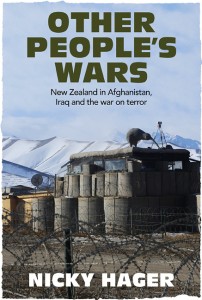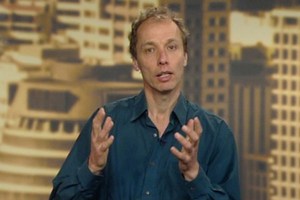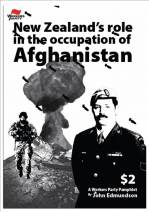Joel Cosgrove, Workers Party, Wellington
Anyone who reads the book will know more about New Zealand military and what it did in Afghanistan, Iraq and the Gulf than any politician in parliament – Nicky Hager.
With his latest book Nicky Hager has blown away the tightly controlled political and military cover for New Zealand’s involvement in Afghanistan and Iraq. The book itself was published on Thursday and once it has been read and analysed The Spark will publish a wider analysis drawn from Hager’s explosive scoop. 
With his previous books ‘Secret Power’, ‘Secrets and Lies’, ‘Seeds of Distrust’, ‘The Hollow Men’ and now ‘Other People’s Wars’ Hager has cemented his place as one of the most important journalists New Zealand has ever produced.
The following is a summary of the key points that Hager makes in his book:
• One of the major themes running throughout the book is the control the military have exerted over the media through public relations methods. Leaked documents show the strategies hatched by the military leadership to keep key events and information from parliament, the media, and the public.
• Right from New Zealand’s first involvement in Afghanistan, confidential critical reports have circulated amongst the defence force concerning the lack of strategy regarding New Zealand involvement in imperialist wars, as well as tactical deficiencies with regard to the New Zealand deployments.
• Primarily New Zealand’s involvement in Afghanistan and Iraq has been motivated by diplomatic, defence, and trade concerns.
• New Zealand’s involvement in the wars has been driven and led by defence staff, with a strong focus on rebuilding what is in effect the ANZUS alliance in all but name.
• Officials and military staff developed a close and tight reign on any negative information coming out of the warzones, they resorted to misleading or outright lying to get a good story.
• New Zealand troops have regularly engaged in combat activity or combat support. This activity was not confined to the SAS.
• New Zealand Navy frigates and Air Force Orions’ were actively involved in supporting the US/UK invasion of Iraq.
• New Zealand’s ‘reconstruction’ efforts in Bamiyan province were at best a fig-leaf and at worst an outright sham. Reconstruction projects were started afresh every 6 months and then left on the wayside with the end of each deployment. The successes hyped up in New Zealand were extremely over-exaggerated or downright lies.
• There were undeclared US intelligence officers in the Kiwi base at Bamiyan who would often debrief New Zealand soldiers directly. New Zealand media were aware of their presence but as a whole, did not report on it, due to the perceived ‘irrelevance’ of raising it.
• Hager has described this as the biggest leak in New Zealand history.
The response to this at Hager’s press conference and afterwards by the media and senior politicians has been illustrative. Guyon Espiner (TVONE political editor) stated that he was not surprised that U.S. intelligence officers were present in the New Zealand Provincial Reconstruction Team base and that he even ate meals with them and was briefed, pledging to keep information secret. He then proceeded to ask Hager if he had gone to Afghanistan, which Hager has not. However Hager’s 1300+ footnotes representing five years of research and interviews has far more authenticity and accuracy when measured against the public relations-parachute-reporting that has characterised the majority of the New Zealand media’s reporting of Afghanistan to date.
Vernon Small in a recent Dominion opinion piece was surprisingly frank when he said that: “In fact, I, and other reporters before me, were introduced to US intelligence and communications staff at Bamiyan and at other Kiwi bases and ate and chatted with them. The stars and stripes flies alongside the New Zealand flag at Bamiyan to advertise the US contingent.”
John Key’s response has been to roll his eyes, rubbish the work on the grounds of its authorship by Hager and state blankly that although he has not read the work, there is no evidence to back up Hager’s claims. This has been an almost carbon copy to his dismissal of Jon Stephenson who is the only other major New Zealand journalist writing independently and critically about New Zealand’s involvement in Afghanistan. The only major difference between Key’s treatment of either journalist is the malice and personal attacks poured on Stephenson.
Phil Goff’s response has not been much better. Refusing to call for an inquiry and describing the book as ‘spurious’, again without reading it. The general response so far from media has been to focus almost entirely on the revelation of the presence of U.S. intelligence officials in the Bamiyan camp, normalising and downplaying the fact by revealing a general knowledge of their presence, justifying it through the nonchalant shrugging of their shoulders at the apparent lack of need to report this to the general public.
Jerry Mateparae, the recent head of the Defence Force, who officially took up the role Governor General on the day of the book’s release, has denied or been unable to recall any of the issues raised in the book. Simon Wilson writing in the Metro (before the publication of the book) wrote, “Mateparae is a former head of the SAS, the Army and the NZDF, and has therefore been responsible, in one capacity or another, for the troops in the field and for advising the government on their activities, for the entire period of the Afghan war.”

This is an aspect that Hager has talked about. Either senior parliamentarians in both the Labour and National governments lied, or they chose not to know about what was going, or both. The denials by both military and parliamentary figures have been clear to say they did not know about CIA bases. Not that there were not bases, or that they were staffed by intelligence figures, just a very specific, very vague wave-off, that relies on Hager not being able to provide documentation that directly links any of these senior figures to the issues raised. Key himself has been clear to talk about the lack of a “smoking gun” in relation to Hager’s claims.
One of the leaks is a confidential 2010 Defence Force report which said the projects overseen by the Provincial Reconstruction Team “…do not appear to be sustainable in any way”. This is a key aspect behind the change in presentation of New Zealand’s support for imperialist interventions. We are ‘peacekeepers’ who are ‘rebuilding’ in occupied lands, from Bosnia, to East Timor and now Afghanistan and Iraq. The language of intervention, invasion, and occupation has changed and been softened to hide away the realities of New Zealand’s support of American invasions which have killed hundreds of thousands of lives over the past decade. Hager’s meticulous documentation deals a striking blow to this notion. New Zealand’s involvement in Afghanistan is about closer ties to the U.S., it is not about ‘hearts and minds’ or provincial reconstruction, it is about providing intelligence and support for the US bombing and indiscriminate attacks on the Afghan people. When they say that the SAS are ‘mentoring’ Afghan troops it is now clear – even though it was obvious before – that it means being at the front of any attacks or operations, not unlike U.S. ‘observers’ in the Vietnam war.
Fran O’Sullivan, in The New Zealand Herald, wrote that there exists “…a culture of secrecy which means New Zealand journalists can obtain clearer information from military websites overseas than is made readily available at home” and said “… much of the official information which the Labour government chose to publish was hopelessly outdated.”
This is the other important aspect of the story which Hager hasn’t engaged on to the same extent. Namely the co-option of the media (as if they weren’t already coopted to begin with). Every journalist who has spoken of their trips to Afghanistan since the publication of Hager’s book has done so as a defence of the establishment and as an attack on Hager’s credibility. None of them thought that the presence of U.S. intelligence officials camped within the New Zealand base was at all at odds with the ‘peacekeeping’, ‘reconstruction’ public face of the mission. The reality is that the media are no longer reporting on the military but instead reporting for the military.
In part the reason for this is that as mainstream journalists, they are reliant on the government and dominant political parties for stories, gossip, and scoops. If they break this system of patronage, then they lose their place in the food-chain.

While various governments have not been able to cow either Stephenson or Hager, both journalists stand as a testament to the ostracisation involved when actually holding power to account. The role of people like Richard Long, who moved from Evening Post editorship to being chief of staff to then National Party leader Don Brash as well as the tight links between media, business and the political sphere shown by the fallout from the News of the World scandal in England makes this symbiotic relationship clear.
Since 2001, the Workers Party and its forerunner organisations have joined in the calls and the marches against the war and New Zealand’s involvement, and on occasions the Workers Party has played key organisational and/or political roles in that movement. Clearly Hagar has outlined how the political parties and senior military figures have learnt and developed their public relations strategies and tactics. We need to learn from this in order to counteract government propaganda and whatever other public relations approaches they attempt next.
Links:
Stephen Price is a media lawyer and advisor to Hager, who has written from his perspective on the book and the issues raised.
http://www.medialawjournal.co.nz/?p=498
Selwyn Manning (Scoop Editor) in an interview on the matter on 95BfM as well as an outline of the book/issues itself
http://www.scoop.co.nz/stories/HL1109/S00006/manning-hagers-new-book-new-gov-general-controversies.htm
Audrey Young provides an outline of the story so far from her perspective
http://www.nzherald.co.nz/audrey-young/news/article.cfm?a_id=164&objectid=10748912
Nicky Hager’s press release announcing the publication and release of the book.
http://www.scoop.co.nz/stories/PO1109/S00013/release-of-nicky-hagers-new-book-other-peoples-wars.htm
Journalist Keith Ng focuses on the role in the media, as well as an interesting discussion within the comments section.
http://publicaddress.net/onpoint/other-peoples-wars/
A confrontational interview with Nicky Hager on TV3
http://www.scoop.co.nz/multimedia/tv/national/55767.html
An outline of the press conference and an audio recording of the Q&A after Hager outlined the general issues raised.
http://www.scoop.co.nz/stories/HL1109/S00007/images-audio-nicky-hagers-new-book-other-peoples-wars.htm
Dominion Post Political Editor Vernon Small plays down Hager’s claims and distracts from the core issues raised.
http://www.stuff.co.nz/national/politics/5551660/Little-kept-from-media-eyes-at-base
Zetetic on the Standard focuses on the drivers behind the media herd mentality.
http://thestandard.org.nz/need-to-know/
Summary of the varied responses to Hager’s book
http://www.scoop.co.nz/stories/HL1109/S00010/rnz-audio-reaction-to-new-nicky-hager-book.htm
Gordon Campbell opines on the book and the controversy surrounding it, as well as a video of the press conference.
http://gordoncampbell.scoop.co.nz/2011/09/02/gordon-campbell-on-nicky-hager%E2%80%99s-new-book/

Just another WordPress site